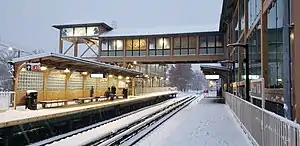Arthur Kill station
The Arthur Kill station is a station on the Staten Island Railway (SIR). The station opened on January 21, 2017, replacing the Atlantic and Nassau stations, which were the two stations in the poorest condition along the line at the time. It is located on Arthur Kill Road near Lion Street and Barnard Avenue, in the Tottenville neighborhood of Staten Island, New York. It has two tracks and two side platforms, and is ADA-accessible via ramps.
Arthur Kill | |||||||||||||||||||||||||||||||||||||||||||||||||||||||||||||||
|---|---|---|---|---|---|---|---|---|---|---|---|---|---|---|---|---|---|---|---|---|---|---|---|---|---|---|---|---|---|---|---|---|---|---|---|---|---|---|---|---|---|---|---|---|---|---|---|---|---|---|---|---|---|---|---|---|---|---|---|---|---|---|---|
 The Arthur Kill station in November 2018 | |||||||||||||||||||||||||||||||||||||||||||||||||||||||||||||||
| General information | |||||||||||||||||||||||||||||||||||||||||||||||||||||||||||||||
| Location | Arthur Kill Road, near Lion Street and Barnard Avenue Tottenville, Staten Island | ||||||||||||||||||||||||||||||||||||||||||||||||||||||||||||||
| Coordinates | 40.5168°N 74.2416°W | ||||||||||||||||||||||||||||||||||||||||||||||||||||||||||||||
| Platforms | 2 side platforms | ||||||||||||||||||||||||||||||||||||||||||||||||||||||||||||||
| Tracks | 2 | ||||||||||||||||||||||||||||||||||||||||||||||||||||||||||||||
| Connections | |||||||||||||||||||||||||||||||||||||||||||||||||||||||||||||||
| Construction | |||||||||||||||||||||||||||||||||||||||||||||||||||||||||||||||
| Structure type | At-grade | ||||||||||||||||||||||||||||||||||||||||||||||||||||||||||||||
| Accessible | Yes | ||||||||||||||||||||||||||||||||||||||||||||||||||||||||||||||
| Other information | |||||||||||||||||||||||||||||||||||||||||||||||||||||||||||||||
| Station code | 523 | ||||||||||||||||||||||||||||||||||||||||||||||||||||||||||||||
| History | |||||||||||||||||||||||||||||||||||||||||||||||||||||||||||||||
| Opened | January 21, 2017[1] | ||||||||||||||||||||||||||||||||||||||||||||||||||||||||||||||
| Services | |||||||||||||||||||||||||||||||||||||||||||||||||||||||||||||||
| |||||||||||||||||||||||||||||||||||||||||||||||||||||||||||||||
| |||||||||||||||||||||||||||||||||||||||||||||||||||||||||||||||
Station layout
This station has two tracks and two side platforms, with an overpass connecting the platforms.[2] As opposed to the Nassau and Atlantic stations, which this station replaces, both platforms can accommodate 300-foot-long (91 m) trains. Those stations only had single-door boarding.[3] There are benches and surveillance cameras on both platforms and windscreens, which are covered by canopies. The total cost of the station was $27.6 million.[4] An art instillation, titled Tottenville Sun, Tottenville Sky and created by Jenna Lucente, was installed in the windscreens as part of the station construction. Consisting of 28 laminated glass panels, it depicts the landscape and wildlife of the adjacent community.[1]
The station is accessible-accessible via two ramps, one on each side of the overpass. It includes a 150-car parking lot,[5] on SIR property, which can be expanded in the future.[4]
| M | Mezzanine | Crossover between platforms |
| G Platform level |
Side platform | |
| Southbound | ← (demolished: Atlantic) | |
| Northbound | (demolished: Nassau) | |
| Side platform | ||
| Street level | Exit/entrance, buses | |
History
.jpg.webp)
The construction of an Arthur Kill station was first proposed in the 1990s to replace the Atlantic and Nassau stations, which were located directly to the north and south of the station, respectively.[6] Commuters from these stations were only allowed access from the last cars of the trains.[7] As a result, these two stations were not included in station modernization programs with other stations. The construction of the station had been deferred due to budget constraints, but funding for it was included in the 2010–2014 MTA Capital Program, with $16 million allocated to the project.[3][8]
Despite a 2010 expected completion date, construction ended up delayed due to a lack of funding in the capital program.[8][9][10] A groundbreaking ceremony was held on October 18, 2013, with a projected opening date of late 2015.[3][4][11] In July 2015, the opening date was then pushed back to August 2016, with delays caused in part by the addition of storm resiliency measures.[4][12] In June 2016, the station's opening was pushed back once again to November due to changes in the Electric Distribution Room.[13][14] In October 2016, the opening date was pushed back yet again to January 2017 because of a need to redesign the electrical distribution room, the exterior wall panel, and various communications issues.[15] The station opened on January 21, 2017, at 5:00 a.m, replacing the adjacent former stations at Nassau and Atlantic, which were permanently closed on the same day.[1]
References
- "New Arthur Kill Station". mta.info. Metropolitan Transportation Authority. January 20, 2017. Retrieved January 20, 2017.
- "Staten Island Railway Celebrates 1st New Station in 20 Years". mta.info. Metropolitan Transportation Authority. January 20, 2017. Archived from the original on January 21, 2017. Retrieved January 21, 2017.
- "MTA | news | Groundbreaking for New MTA Staten Island Railway Arthur Kill Station in Tottenville". mta.info. Metropolitan Transportation Authority. October 18, 2013. Retrieved January 21, 2017.
- Barone, Vincent (July 30, 2015). "Double delays: 2 Staten Island Railway station projects pushed back again". SILive.com. Retrieved December 27, 2016.
- "mta.info | Constructing a new Arthur Kill Station". mta.info. Metropolitan Transportation Authority. Retrieved January 22, 2017.
- Engels, Mary (December 28, 1995). "NEW PLANS FOR S.I. TRANSIT BUS-RAIL-FERRY LINKS PROPOSED". New York Daily News. Retrieved August 26, 2018.
- "Station Information". MTA.
- "MTA Capital Program 2008–2013" (PDF). February 2008. p. 176. Retrieved January 4, 2015.
- "Partial Closure of the Staten Island Railway Nassau Station" (Press release). MTA New York City Transit. August 30, 2010. Retrieved January 4, 2015.
- Yates, Maura (April 30, 2010). "Sorry, SIR: No new cars for Staten Island Railway". Staten Island Advance. Archived from the original on May 3, 2010. Retrieved May 6, 2010.
- Stein, Mark D. (October 18, 2013). "Groundbreaking for new Arthur Kill Staten Island Railway station, set to open in 2015". Staten Island Advance. Retrieved January 4, 2015.
- "Untitled Document". web.mta.info. Retrieved June 17, 2016.
- "Capital Program Oversight Committee Meeting June 2016" (PDF). www.mta.info. Metropolitan Transportation Authority. June 17, 2016. Retrieved June 17, 2016.
- "Opening of Staten Island Railway's New Arthur Kill Station Delayed". TWC News. June 18, 2016. Retrieved December 27, 2016.
- "Capital Program Oversight Committee Meeting" (PDF). mta.info. Metropolitan Transportation Authority. October 2016. Retrieved November 6, 2016.
External links
- Staten Island Railway station list
- Staten Island Railway general information
- Platforms from Google Maps Street View
- Stairs and ramp to overpass from Google Maps Street View
- Overpass from Google Maps Street View
- View from Arthur Kill Road from Google Maps Street View
- View from Ellis Street from Google Maps Street View